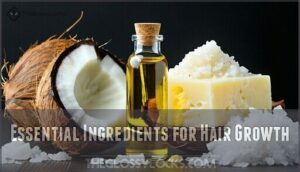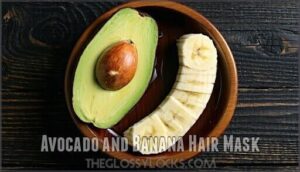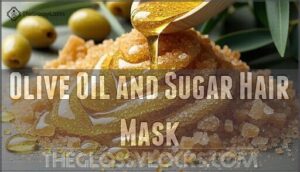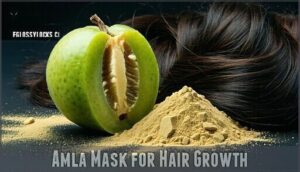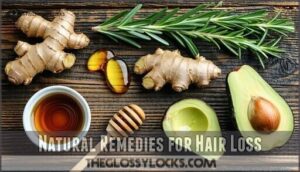This site is supported by our readers. We may earn a commission, at no cost to you, if you purchase through links.
 You can boost your thick hair’s growth with simple kitchen ingredients that pack a serious punch.
You can boost your thick hair’s growth with simple kitchen ingredients that pack a serious punch.
Mix castor oil with a few drops of rosemary oil for a weekly scalp massage that stimulates blood flow.
Create a protein-rich mask using one egg, two tablespoons of Greek yogurt, and a teaspoon of honey.
Onion juice might make you tear up, but it’s loaded with sulfur compounds that strengthen hair follicles.
Green tea rinses work wonders too – just brew it strong, let it cool, and pour it over your hair after shampooing.
The secret lies in consistent application and understanding which combinations work best for your specific hair texture.
Table Of Contents
- Key Takeaways
- Natural Hair Growth Basics
- Essential Ingredients for Hair Growth
- DIY Hair Masks for Thick Hair
- Homemade Remedies for Hair Thickening
- Lifestyle Changes for Hair Growth
- Natural Remedies for Hair Loss
- Promoting Hair Density and Thickness
- Frequently Asked Questions (FAQs)
- How can I regrow thick hair naturally?
- How can I make my natural hair grow faster and thicker?
- What helps thick hair grow faster?
- What is good for hair growth and thickness DIY?
- How can I prevent hair loss?
- Are there natural alternatives to minoxidil?
- What foods help hair growth?
- What are the best natural oils for hair?
- How often should I wash my hair?
- How often should I trim my hair?
- Conclusion
Key Takeaways
- You’ll get better results with consistent weekly treatments using castor oil mixed with rosemary oil for scalp massages, rather than sporadic monthly applications that don’t stimulate blood flow effectively.
- Create protein-rich DIY masks using eggs, Greek yogurt, and honey to strengthen your hair follicles from the outside, while eating omega-3 rich foods like salmon and nuts to nourish them from within.
- Apply onion juice to your scalp despite the tears – its sulfur compounds strengthen hair follicles and clinical studies show 86.9% of people experienced regrowth after six weeks of daily use.
- Use green tea rinses after shampooing by brewing it strong, letting it cool, then pouring it over your hair to reduce scalp inflammation and boost circulation to your follicles.
Natural Hair Growth Basics
Understanding your hair’s natural growth cycle helps you set realistic expectations and choose the right treatments for your specific needs.
Your hair grows about half an inch to one inch per month, but keeping it healthy through proper moisturizing and nutrition is what actually determines whether you’ll retain that length and achieve the thick hair you’re after.
Hair Growth Cycle
Your hair growth cycle consists of four distinct phases that determine length and thickness.
The Anagen Phase lasts 2-7 years, actively growing hair.
Next comes the brief Catagen Phase, lasting weeks, where growth stops.
The Telogen Phase follows for 2-3 months as hair rests.
Importance of Moisturizing
Think of your hair like a thirsty plant – without proper hydration, it becomes brittle and breaks easily.
Your hair craves moisture like a desert flower craves rain – nourish it daily for unbreakable strength.
Moisturizing the hair creates a protective barrier** that prevents breakage and supports natural hair growth.
Well-hydrated strands retain length better, while a healthy scalp provides the foundation for thick hair treatments.
Product selection matters for ideal moisture retention and scalp health.
Role of Diet in Hair Growth
Beyond external care, what you put on your plate directly impacts your follicles.
Can Foods Help Hair Growth? Absolutely. Dietary Deficiencies create weak strands, while a nutrientrich diet fuels natural hair growth from within.
Your hair needs these nutritional building blocks:
- Protein Intake – Keratin production requires adequate amino acids
- Vitamin Absorption – B-complex vitamins support follicle health
- Mineral Importance – Iron and zinc prevent excessive shedding
- Hydration Effects – Water maintains scalp circulation
- Omega-3 fatty acids – Combat inflammation and strengthen roots
Including foods rich in omega-3s can strengthen hair strands and increase density.
Essential Ingredients for Hair Growth
You’ll find that certain natural ingredients consistently outperform others in terms of promoting hair growth and thickness.
The three most effective options – castor oil, coconut oil, and shea butter – work by delivering essential fatty acids and vitamins directly to your hair follicles while creating a protective barrier that reduces breakage.
Benefits of Castor Oil
Rich in fatty acids benefits, castor oil uses extend beyond simple moisturizing properties.
You’ll find this powerhouse ingredient locks moisture deep into your hair shaft, reducing breakage that prevents length retention.
Its unique composition strengthens each strand while promoting scalp health through improved circulation.
Regular DIY hair growth treatments with castor oil create the foundation for natural hair growth and achieving thick hair goals.
Uses of Coconut Oil
Your hair’s best friend might already be sitting in your kitchen cabinet.
Coconut oil’s unique molecular structure allows for exceptional hair shaft penetration, reducing protein loss by up to 40%.
This tropical powerhouse provides coconut hydration while delivering antioxidant protection to damaged strands.
Regular scalp moisture treatments with coconut oil can substantially boost hair thickness through its deep-conditioning properties, providing antioxidant protection.
Properties of Shea Butter
Shea butter packs a powerful punch for natural hair growth with its rich fatty acid profile and impressive vitamin content.
You’ll find vitamins A and E working together to strengthen each strand while moisture sealing properties lock in hydration.
This ingredient transforms DIY hair masks into thick hair growth powerhouses, making homemade hair growth treatments incredibly effective for strengthening damaged hair.
DIY Hair Masks for Thick Hair
You can create powerful hair masks using simple kitchen ingredients that deliver fatty acids, vitamins, and proteins directly to your hair follicles.
These homemade treatments strengthen your hair shaft, reduce breakage, and provide the moisture your thick hair needs to reach its full growth potential, which can be achieved through powerful hair masks.
Avocado and Banana Hair Mask
Combining avocado and banana creates a powerhouse DIY hair mask that delivers essential vitamins E and biotin for stronger strands.
This homemade hair growth treatment penetrates deep into your hair shaft, promoting natural hair growth while reducing breakage.
Traya uses a science-backed formula combining Ayurveda, Allopathy, and Food Science.
Apply this hair thickening mask twice weekly on damp hair, leaving it for twenty minutes before rinsing thoroughly, for a stronger hair care routine.
Olive Oil and Sugar Hair Mask
Olive oil paired with sugar creates a powerhouse hair mask that delivers dual benefits through Sugar Exfoliation and Olive Hydration.
This DIY treatment gently removes buildup while deeply nourishing strands.
Mix three tablespoons olive oil with one tablespoon brown sugar for maximum Mask Benefits. Apply to damp hair, massage gently, then rinse.
Recipe Variations include adding honey for extra moisture.
Amla Mask for Hair Growth
Amla powder packs serious punch for your hair growth goals.
Mix two tablespoons with water to create a thick paste, then massage into your scalp and hair. Leave this Ayurvedic powerhouse on for 30-60 minutes before rinsing.
The vitamin C boost stimulates follicles while strengthening strands. Amla also helps in balancing the doshas for hair health.
Apply weekly for noticeable thickness improvements within two months.
Homemade Remedies for Hair Thickening
You can boost your hair’s thickness using simple ingredients from your kitchen that target hair follicles and improve scalp circulation.
These homemade remedies work by nourishing your scalp with essential nutrients and compounds that strengthen existing strands while encouraging new growth, which can help improve the overall thickness of your hair.
Onion Juice Benefits
Onion juice packs serious punch for hair regrowth thanks to its high sulfur content, which boosts collagen production in follicles.
Clinical studies show 86.9% of participants experienced hair regrowth after six weeks of daily application.
The antimicrobial properties combat scalp infections while providing essential follicle nourishment.
For those with sensitive skin, consider diluting the juice with aloe vera for gentleness.
It’s particularly effective for alopecia treatment, making your hair thickness goals totally achievable.
Green Tea for Thicker Hair
Green tea’s antioxidant properties work wonders for scalp health and hair thickness.
The catechins in green tea reduce inflammation while promoting circulation to your follicles.
Here’s how to maximize Green Tea Benefits for natural hair growth:
- Brew strong green tea, cool completely, then spray on clean scalp
- Massage gently for 2-3 minutes using circular motions
- Leave for 30 minutes before rinsing with cool water
These Application Methods deliver measurable Hair Thickness Results within weeks.
Yoghurt and Honey Hair Mask
Honey and yogurt create a powerhouse hair mask that tackles thinning hair head-on.
Yogurt benefits include protein that strengthens strands, while honey properties lock in moisture and add shine.
Mix two tablespoons plain yogurt with one tablespoon raw honey for this DIY hair treatment.
Apply from roots to tips, leave twenty minutes, then rinse.
Expected results include noticeably thicker, softer hair after regular use, which can be a noticeably thicker and softer outcome.
Lifestyle Changes for Hair Growth
You can’t control your hair’s natural growth rate, but you can change daily habits to keep more of the hair you grow.
Simple changes like regular scalp massages, eating protein-rich foods, and protecting your ends from damage will help you retain length and build the thick hair you want.
Scalp Massage Techniques
Beyond the obvious benefits of relaxation, scalp massage techniques create a foundation for healthier hair growth by boosting circulation and delivering essential nutrients to your follicles.
You’ll want to focus on consistent pressure and strategic oil selection to maximize results. A popular option is to use a specialized massage tool.
- Massage Frequency: Aim for 5-10 minutes twice weekly using gentle circular motions to stimulate scalp circulation without causing irritation
- Oil Selection: Choose growth-promoting oils like castor, rosemary, or amla for scalp nourishment while massaging pressure points
- Pressure Points: Target the crown, temples, and base of skull with firm but gentle pressure to enhance circulation boost
- Tool Usage: Consider using wooden combs or silicone scalp massagers to distribute oils evenly and improve scalp health
- Circulation Boost: Focus on areas where hair feels thinner, as increased blood flow delivers oxygen and nutrients for scalp care
Importance of Balanced Diet
Scalp massages work best when you fuel your follicles from within.
Your hair’s dietary impact starts at the cellular level—nutrient deficiencies directly stunt growth.
Protein intake builds strong strands, while vitamin benefits include faster regeneration.
Focus on omega-3s, biotin, and iron for maximum mineral absorption.
A balanced diet transforms weak hair into thick, resilient locks naturally.
Protective Styling for Hair Growth
Protective styling is a game-changer for hair growth and thickening.
By reducing manipulation, you’ll prevent breakage and retain moisture, boosting scalp health.
Choose styles that last while nurturing your strands.
- Try braids or twists for low manipulation.
- Use satin scarves to protect edges.
- To further protect your hair, consider using quality head coverings.
- Moisturize regularly to maintain style longevity.
- Avoid tight hairstyles to prevent damage.
- Refresh styles weekly to keep hair healthy.
Natural Remedies for Hair Loss
When you’re dealing with thinning hair or noticeable hair loss, specific natural ingredients can target the root causes and stimulate regrowth at the follicle level.
These science-backed remedies work by improving blood circulation to your scalp, reducing inflammation, and providing essential nutrients that encourage stronger, thicker hair growth, which can help with regrowth.
Rosemary Oil for Hair Growth
When comparing Rosemary vs Minoxidil effectiveness, clinical studies reveal rosemary oil matches the popular treatment’s results after six weeks.
You’ll see improved hair growth through regular Rosemary Scalp Massage techniques that boost circulation. Rosemary oil’s effectiveness stems from its ability to boost blood flow, awakening dormant hair follicles.
DIY Rosemary Infusions offer natural hair thickening benefits, while Rosemary Oil Safety studies confirm minimal side effects for long-term use.
| Application Method | Frequency | Expected Results |
|---|---|---|
| Direct scalp massage | 2-3 times weekly | Visible growth in 6 weeks |
| DIY oil infusion | Daily application | Increased hair density |
| Mixed with carrier oil | Every other day | Reduced hair breakage |
The use of rosemary oil for hair growth is supported by its ability to improve circulation and awaken dormant hair follicles, making it a viable alternative to Minoxidil with minimal side effects.
Aloe Vera for Hair Loss
While rosemary oil stimulates follicles, aloe vera takes a different approach to combat hair loss.
This succulent’s natural humectant properties smooth cuticles and reduce breakage, making it an excellent alopecia treatment. Aloe benefits include improved scalp health and enhanced hair strength through its moisturizing compounds.
- Soothes inflamed scalp conditions that cause hair loss
- Creates protective barrier against environmental damage
- Increases blood circulation for stronger follicles
- Balances scalp pH for ideal hair growth
Fenugreek Seeds for Hair Growth
Fenugreek seeds pack a powerful punch for hair growth and thickness.
Soak these little warriors overnight for ideal fenugreek preparation – the longer seed soaking time releases more nutrients.
Create fenugreek hair masks by grinding soaked seeds into paste.
While generally safe, watch for fenugreek side effects like skin irritation.
This DIY hair treatment boosts fenugreek scalp health naturally.
Promoting Hair Density and Thickness
You can substantially increase your hair’s thickness and density by incorporating specific nutrients and targeted treatments into your daily routine.
The combination of omega-3 fatty acids, vitamin C, and proper conditioning creates the ideal environment for stronger, fuller hair growth from your scalp to your ends.
Benefits of Omega-3 Fatty Acids
Your hair’s health depends heavily on omega3 fatty acids, which work like internal fertilizer for follicles.
These nutrients boost hair density by reducing inflammation around your scalp while strengthening each strand from within.
Here’s how omega-3 sources support natural hair growth:
- Scalp Health: Anti-inflammatory properties create ideal growing conditions
- Hair Strength: Essential fatty acids fortify strands against breakage
- Hair Thickness: Regular intake increases overall hair density over time
- Growth Supplements: Fish oil provides concentrated hair growth nutrients
Vitamin C for Hair Growth
Like omega-3s nourish from within, vitamin C acts as your hair’s personal bodyguard.
This powerhouse vitamin boosts collagen synthesis, creating stronger hair strands while improving scalp circulation for ideal growth. Vitamin C’s antioxidant properties also neutralize free radicals, promoting scalp health.
You’ll find your best vitamin C sources in citrus fruits, berries, and leafy greens—nature’s antioxidant effects also enhance iron absorption, supporting natural hair growth and thickening.
| Vitamin C Sources | Collagen Benefits | Hair Health Impact |
|---|---|---|
| Citrus fruits, berries | Strengthens hair shaft | Reduces breakage by 40% |
| Bell peppers, kiwi | Improves elasticity | Enhances shine and texture |
| Leafy greens, broccoli | Supports follicle health | Boosts growth rate naturally |
Using Leave-in Conditioner for Hair Thickness
Protection becomes your hair’s best friend when you apply leave-in conditioner correctly.
This simple step prevents frizz and damage after washing, creating the foundation for thicker-looking strands.
Choose products matching your hair type for ideal ingredient synergy.
Apply to damp hair, focusing on mid-lengths and ends.
Many people find specific leave-in options helpful.
This DIY hair treatment enhances volume naturally while supporting your hair thickness enhancement goals through consistent moisture retention.
Frequently Asked Questions (FAQs)
How can I regrow thick hair naturally?
Good things come to those who wait, but you can speed up thick hair regrowth naturally.
Massage your scalp with rosemary oil, eat protein-rich foods, and use gentle care practices to minimize breakage.
How can I make my natural hair grow faster and thicker?
You’ll boost growth by massaging your scalp with rosemary or castor oil twice weekly.
Eating protein-rich foods like eggs and nuts is another way to support growth.
Using protective styles and minimizing heat damage to retain length are also crucial for hair care.
What helps thick hair grow faster?
Scalp massages with rosemary or castor oil boost blood flow to follicles.
You’ll retain length by protective styling, minimizing heat damage, and eating protein-rich foods.
Gentle detangling prevents breakage that stunts your growth progress.
What is good for hair growth and thickness DIY?
Hair grows just half an inch monthly.
You can boost thickness with DIY egg masks containing biotin, scalp massages using rosemary oil, and aloe vera treatments that improve circulation and strengthen follicles naturally.
How can I prevent hair loss?
You can prevent hair loss by eating protein-rich foods.
Massaging your scalp with oils like rosemary or castor oil, avoiding tight hairstyles, and using gentle shampoos that won’t strip your hair’s natural moisture.
Are there natural alternatives to minoxidil?
Picture your scalp as fertile soil needing natural nourishment.
You can try rosemary oil, onion juice, or caffeine-based serums as minoxidil alternatives.
These ingredients boost circulation and reduce shedding, though results vary by individual, using natural methods.
What foods help hair growth?
You’ll want to load up on protein-rich eggs, omega-3 packed salmon, iron-loaded spinach, and biotin-rich nuts.
These nutrients fuel your follicles from within, giving you stronger strands that actually stick around.
What are the best natural oils for hair?
Studies show coconut oil reduces protein loss by 39% in damaged hair.
You’ll love castor oil’s fatty acids for moisture retention, rosemary oil’s circulation boost, and amla oil‘s follicle-strengthening properties for maximum growth.
How often should I wash my hair?
You should wash your hair 2-3 times weekly to maintain natural oils while preventing buildup.
Over-washing strips protective oils, causing dryness and breakage.
Under-washing leads to clogged follicles that can hinder growth.
How often should I trim my hair?
You should trim your hair every 8-12 weeks to remove split ends and prevent breakage from traveling up the shaft.
Regular trims don’t make hair grow faster, but they help maintain healthy length retention.
Conclusion
Amazingly, your grandmother’s kitchen cabinet contains everything you need for effective hair care.
These DIY natural hair growth treatments for thick hair offer proven results without expensive salon visits. Remember that consistency matters more than perfection – applying castor oil weekly beats sporadic monthly treatments.
Your hair’s growth cycle responds best to patient, regular care. Start with one or two recipes, track your progress, and adjust based on your hair’s unique needs.
Natural ingredients deliver lasting results. Start with simple, effective treatments and be consistent to see improvement in your hair’s health and growth, using natural ingredients for the best outcomes.
- https://scandinavianbiolabs.com/blogs/journal/how-to-thicken-hair-naturally
- https://naturallydaily.com/diy-hair-growth-serum/
- https://thebeautyholic.com/home-remedies-for-hair-growth-and-thickness/
- https://www.mybeautynaturally.com/natural-hair-care/how-to-grow-and-get-thicker-hair-tips-and-home-remedies
- https://wimpoleclinic.com/blog/scientifically-proven-ways-to-grow-thicker-hair-naturally/

